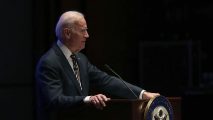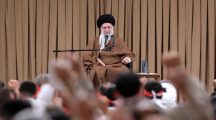19, October 2017
Southern Cameroons Crisis: International Crisis Group says Biya must go beyond superficial measures and take responsibility 0
Cameroon must urgently rethink a policy of “murderous repression” in its restive English-speaking regions or risk the crisis spiralling into an armed uprising, the International Crisis Group (ICG) warned Thursday. In a report on the political crisis in the west African nation, the NGO said the government’s crackdown on the anglophone minority had failed and had only served to fuel a clamour for independence.
French-speaking Cameroon has a large anglophone minority which comprises around a fifth of its population of 22 million. Gathered mainly in two regions, many English-speakers say the suffer inequality and discrimination.
Simmering resentment has fuelled a breakaway movement that on October 1 issued a symbolic declaration of independence for the putative state of Ambazonia, prompting a crackdown by a government firmly opposed to secession.
In the face of mounting protests in the runup to the declaration, the security forces “responded with disproportionate force, leading to at least 40 deaths and over 100 injured protesters between September 28 and 2 October,” the ICG said.
It pointed to the use of live rounds and excessive use of teargas. “Due to such murderous repression, secessionist ranks are growing by the day, and some are more firmly evoking the idea of an armed struggle or ‘self defence’,” it said.
Cameroon’s President Paul Biya, 84, must act swiftly to find a serious political solution to the crisis, and it was also crucial that the international community speak out firmly against such state violence, the ICG said.
“If he hopes to avoid an armed uprising in Anglophone regions, which would without doubt have an impact in the Francophone zone, the Cameroonian president must go beyond superficial measures and take responsibility in order to find political solutions to the crisis.”
The report was published three days after Prime Minister Philemon Yang began a visit to the Northwest Region, one of the two troubled anglophone areas, as part of what he termed a “dialogue” with the English-speaking minority.
Yang travelled to Bamenda, the main regional town, where he met the heads of trade unions in the transport, education and shopping sectors, as well as with bankers and other business figures, Cameroon Radio Television (CrTV) said.
He delivered “a message of peace and living in harmony” while those who met him put forward proposals “for a definitive way out of the crisis,” it said, without giving further details.
Source: The Guardian































19, October 2017
North Korea threatens to launch ‘unimaginable’ strike on US 0
North Korea has threatened to launch an “unimaginable” strike on the United States as massive joint US-South Korean naval drills are underway off the Korean Peninsula, involving colossal American aircraft carrier the USS Ronald Reagan.
“The US is running amok by introducing under our nose the targets we have set as primary ones. The US should expect it would face [an] unimaginable strike at an unimaginable time,” said a government statement carried by the North’s Korean Central News Agency (KCNA) on Thursday.
What Pyongyang referred to as the “primary” target is the 100,000-ton nuclear powered aircraft carrier, which is patrolling some 160 kilometers to the east of the peninsula and launched almost 90 F-18 Super Hornet sorties from its deck.
The military exercises, regarded by Pyongyang as highly provocative, began on Monday and will run through October 26. They involve 40 warships deployed in a line stretching from the Yellow Sea west of the peninsula into the Sea of Japan.
The North has already denounced Seoul and Washington’s war games, condemning the move as a “rehearsal for war.”
Washington’s military maneuvers with its close ally, the South, come ahead of US President Donald Trump’s visit to Japan and South Korea scheduled to start on November 5.
Trump has taken a tough stance against Pyongyang, threatening to “totally destroy” North Korea if necessary and calling North Korean leader Kim Jong-un names. Kim has responded with threats, vowing to take the “highest-level” measures against the US.
Meanwhile, the South Korean military threatened that it would be quick to totally destroy North Korea’s front-line artillery systems in the event of a war on the peninsula.
The US and the North have been at loggerheads over Pyongyang’s weapons and nuclear programs. However, tensions on the Korean Peninsula have recently risen sharply following a series of weapons tests by Pyongyang, including its sixth and most powerful nuclear test on September 3 and two missiles launched over Japan. Back in July, the North also claimed that it had fired two intercontinental ballistic missiles.
North Korea is under mounting international pressure over its missile and military nuclear programs and has been subjected to an array of sanctions by the United Nations. However, Pyongyang says it needs to continue and develop the programs as a deterrent against hostility by the US and its regional allies, including South Korea and Japan.
Source: Presstv